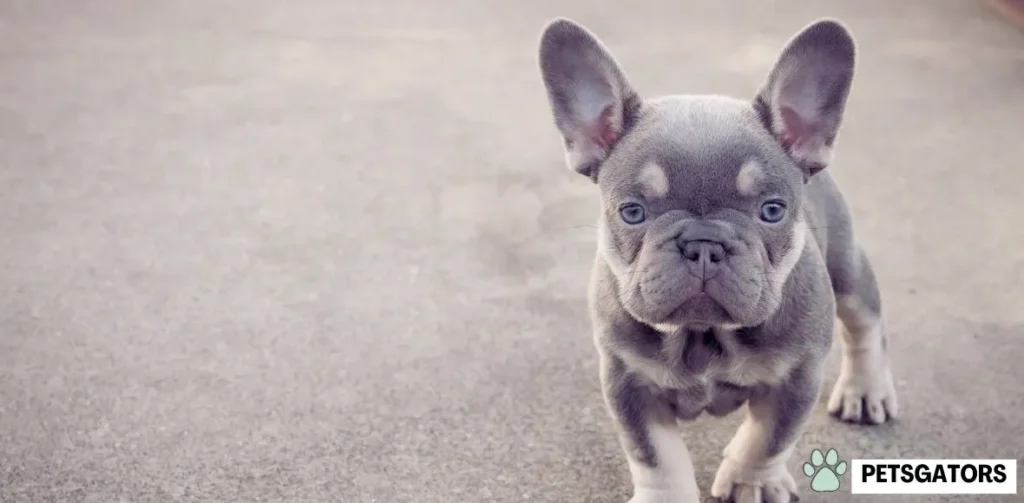Hello, fellow dog enthusiasts! Today, I’m thrilled to share my insights on a topic close to my heart – caring for Blue Frenchie Puppy. These adorable little creatures have a way of stealing our hearts, but it’s essential to approach their care with knowledge and love. So, let’s dive into the world of Blue Frenchies!
Understanding Your Blue Frenchie
First off, understanding what makes Frenchies special is key. These pups are known for their playful and affectionate nature, but they also have unique needs due to their distinctive physical characteristics.

Feeding Your Frenchie
“What do Blue Frenchies eat?” is a common question among new owners. These pups thrive on high-quality dog food tailored to their age, size, and activity level. But remember, each Frenchie is unique, so you might need to adjust their diet based on their specific health needs.
If you’re looking for more detailed information, this French Bulldog Puppy Care Guide is a fantastic resource.
Do’s and Don’ts
It’s crucial to know what not to do with a Frenchie puppy. Avoid over-exercising them, as they can easily become overheated due to their flat faces. Also, be cautious with high surfaces; their adventurous spirit can sometimes lead to risky jumps.
Keeping Your Frenchie Happy
Happiness for a Frenchie is all about love, play, and social interaction. Regular playtime, walks, and cuddles keep them content. And how do you show your Frenchie you love them? Simple gestures like gentle petting, speaking in a soft voice, and spending quality time together can make a world of difference.

Frenchie Favorites
French Bulldogs adore activities that stimulate their minds and bodies. Think of puzzle toys, short walks, or even agility training tailored to their capabilities. However, remember to always keep their physical limitations in mind.
Common Issues
The biggest problem with French Bulldogs often revolves around their health, particularly breathing difficulties due to their brachycephalic nature. Regular vet check-ups are essential.
Understanding Frenchie Annoyances
Frenchies can get annoyed by excessive noise, being ignored, or rough handling. They are sensitive souls who thrive on gentle care.
Dietary Restrictions
There are certain foods that Frenchies should never eat, such as chocolate, grapes, and onions. Before adding any new items to their diet, it’s crucial to seek guidance from your veterinarian.
Allergies in Frenchies
Allergies are not uncommon in French Bulldogs. They can be allergic to certain foods, pollen, or even household products. Keeping an eye on any unusual symptoms and consulting with your vet is key.
Growth and Development
By around 12 to 14 months, your Frenchie should be full-grown. This period is crucial for their development, both physically and mentally.

Can Frenchies Eat Rice?
Yes, in moderation. Rice can be a good source of carbohydrates for Frenchies, especially if they have a sensitive stomach.
The Importance of a Good Bed
Do Frenchies need a bed? Absolutely! A comfortable bed not only gives them a sense of security but also supports their joints.
Leaving Your Frenchie Alone
Can you leave your Frenchie puppy alone? Yes, but not for extended periods. These dogs crave companionship and can develop separation anxiety.
Is Your Frenchie Happy?
You’ll know your Frenchie is happy when they show signs of affection, have a good appetite, and are playful and curious about their surroundings.
Finding Your Blue Frenchie
If you’re wondering where to find a Blue Frenchie puppy, reputable breeders or rescue centers specializing in French Bulldogs are your best bet.
The Joy of Owning a Blue Frenchie
Owning a Blue Frenchie brings immense joy and companionship. Their loving nature and unique personality make every day special. For a deeper dive into the joys of owning a Blue Frenchie, check out Your Guide To Blue Frenchie.
Is a Blue Frenchie Right for You?
Choosing a Blue Frenchie is a big decision. Their unique needs and personality traits should align with your lifestyle and capacity to provide care.
Why Choose a Blue Frenchie?
Blue Frenchies are not just adorable; they’re loyal, affectionate, and relatively low-maintenance, making them perfect for various households.
The Best Time to Introduce a Frenchie Puppy
The best time to introduce a Frenchie puppy into your home is when you’re fully prepared to dedicate time, love, and resources to their care.

10 Tips for Caring for Your Blue Frenchie Puppy
- Regular vet check-ups.
- Balanced diet.
- Gentle exercise.
- Avoid overheating.
- Regular grooming.
- Socialization from an early age.
- Training with positive reinforcement.
- Monitoring for allergies.
- Ensuring mental stimulation.
- Lots of love and affection.
The Impact of a Blue Frenchie on Our Lives
These little bundles of joy bring laughter, love, and a unique companionship that enriches our lives in countless ways.
Caring for a Blue Frenchie puppy is a rewarding journey filled with love, laughter, and learning. Remember, each Frenchie is unique and deserves the best care tailored to their needs. Here’s to the wonderful adventure that awaits with your Blue Frenchie!
Conclusion
In conclusion, welcoming a Blue Frenchie into your life is a delightful and fulfilling experience. These charming little companions, with their distinctive looks and loving personalities, bring immense joy and affection into our homes. However, it’s important to approach their care with dedication and understanding.
From their specific dietary needs to their unique health considerations, every aspect of caring for a Blue Frenchie requires attention and love. By educating yourself, consulting with veterinarians, and providing a nurturing environment, you can ensure a happy and healthy life for your furry friend.
Remember, the bond you develop with your Blue Frenchie is not just about the care you provide; it’s about the countless moments of joy, laughter, and unconditional love that you will share. Here’s to the wonderful journey ahead with your Blue Frenchie, filled with love, learning, and lots of cuddles!
FAQs
1. How often should I feed my Blue Frenchie puppy?
Answer: Blue Frenchie puppies should be fed 3-4 times a day up to six months old. As they grow older, you can reduce this to twice a day. It’s crucial to use high-quality puppy food formulated for small breeds and follow the recommended portion sizes.
2. Can Blue French Bulldogs handle hot weather?
Answer: Due to their brachycephalic (flat-faced) nature, Blue Frenchies can struggle in hot weather. It’s essential to keep them cool, provide plenty of water, and avoid strenuous exercise during hot days to prevent overheating.
3. How do I socialize my Blue Frenchie puppy?
Answer: Start socializing your puppy early by exposing them to different people, pets, and environments in a controlled and safe manner. Positive reinforcement and gentle introductions are key to helping them become well-adjusted adults.
4. Are Blue French Bulldogs good with children?
Answer: Yes, Blue Frenchies are generally good with children. They are recognized for their kind and loving demeanor. However, like with all dog breeds, it’s important to supervise interactions between your puppy and young children to ensure safety for both.
5. How can I tell if my Blue Frenchie is healthy?
Answer: A healthy Blue Frenchie should have clear eyes, a healthy coat, a good appetite, and be active and playful. Regular vet check-ups are essential for monitoring their health, especially since Frenchies are prone to certain health issues like respiratory problems.
Keep an eye out for any signs of distress or unusual behavior and consult your vet if you have concerns.







